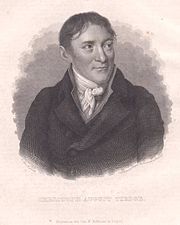
Christoph August Tiedge
Encyclopedia

Gardelegen
Gardelegen is a town in Saxony-Anhalt, Germany. It is situated on the right bank of the Milde, 20 m. W. from Stendal, on the main line of railway Berlin-Hanover....
- 8 March 1841, Dresden
Dresden
Dresden is the capital city of the Free State of Saxony in Germany. It is situated in a valley on the River Elbe, near the Czech border. The Dresden conurbation is part of the Saxon Triangle metropolitan area....
) was a German poet.
Biography
Tiedge was the eldest son of the rector of the Gelehrten Stadtschule in Gardelegen and his wife, and studied law in Halle, Saxony-AnhaltHalle, Saxony-Anhalt
Halle is the largest city in the German state of Saxony-Anhalt. It is also called Halle an der Saale in order to distinguish it from the town of Halle in North Rhine-Westphalia...
. In 1788 he went to Halberstadt
Halberstadt
Halberstadt is a town in the German state of Saxony-Anhalt and the capital of the district of Harz. It is located on the German Half-Timbered House Road and the Magdeburg–Thale railway....
, acting for four years as secretary to the Domherr von Steder. After the Domherr died, Tiedge and his family moved to the vicinity of Quedlinburg
Quedlinburg
Quedlinburg is a town located north of the Harz mountains, in the district of Harz in the west of Saxony-Anhalt, Germany. In 1994 the medieval court and the old town was set on the UNESCO world heritage list....
. After the death of his wife, von Steder, in 1797, he alternated between living in Halle and Berlin
Berlin
Berlin is the capital city of Germany and is one of the 16 states of Germany. With a population of 3.45 million people, Berlin is Germany's largest city. It is the second most populous city proper and the seventh most populous urban area in the European Union...
and (from 1805 to 1808) accompanying his friend Elisa von der Recke
Elisa von der Recke
Elisa von der Recke was a Baltic German writer and poet.-Family:Elisa von der Recke was born in Schönberg, Skaistkalne parish, Courland, the daughter of Reichsgraf Friedrich von Medem and his wife, Louise Dorothea von Korff. Her younger half-sister was Dorothea von Medem, for whom she carried out...
through Germany, Switzerland and Italy. From 1819 Tiedge lived with Elisa in Dresden. Placed beyond material care by his friend's last will, he continued to live there after her death until his.
Some singable lyrics, of which “Schöne Minka, ich muss scheiden” is an example, first established his reputation, and Urania über Gott, Unsterblichkeit und Freiheit (1800; 18th ed., 1862), a lyric-didactic poem, inspired by the ethics of Emanuel Kant, enjoyed wide popularity in the beginning of the nineteenth century. A kind of sequel to it were the Wanderungen durch den Markt des Lebens (1833). Among his other poetical efforts, the Elegien und vermischte Gedichte (1803) met with the greatest success. After his death, the Tiedge Foundation was established in Dresden for the purpose of caring for the poet's grave and of granting subventions to poets and artists or their widows and children. Administered by the Saxon Ministry of Public Instruction, its funds amounted to more than 662,000 marks in 1901.
Sources
This work in turn cites:-
- Falkenstein, Tiedges Leben und poetischer Nachlass (Leipzig, 1841)
- Eberhard, Blicke in Tiedges und Elisas Leben (Berlin, 1844)
- Kern, Beiträge zu einer Charakteristik des Dichters Tiedge (Berlin, 1896)

